Petrie: Egyptian Tales
XIXth Dynasty
Anpu and Bata
Once there were two brethren, of one mother and one father; Anpu was the name of the elder, and Bata was the name of the younger. Now, as for Anpu he had a house, and he had a wife. But his little brother was to him as it were a son; he it was who made for him his clothes; he it was who followed behind his oxen to the fields; he it was who did the ploughing; he it was who harvested the corn; he it was who did for him all the matters that were in the field. Behold, his younger brother grew to be an excellent worker, there was not his equal in the whole land; behold, the spirit of a god was in him.
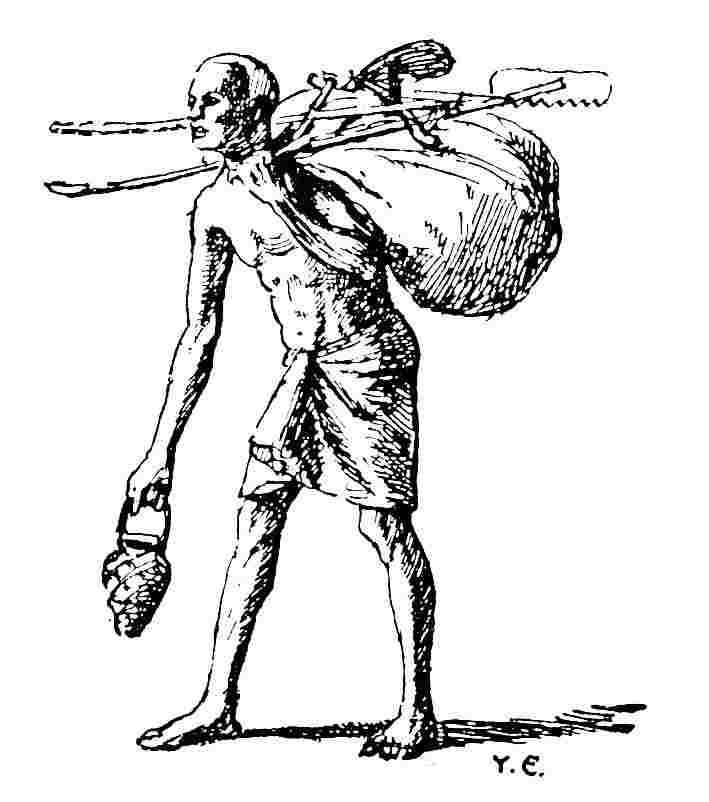
Now after this the younger brother followed his oxen in his daily manner; and every evening he turned again to the house, laden with all the herbs of the field, with milk and with wood, and with all things of the field. And he put them down before his elder brother, who was sitting with his wife; and he drank and ate, and he lay down in his stable with the cattle. And at the dawn of day he took bread which he had baked, and laid it before his elder brother; and he took with him his bread to the field, and he drave his cattle to pasture in the fields. And as he walked behind his cattle, they said to him, "Good is the herbage which is in that place;" and he listened to all that they said, and he took them to the good place which they desired. And the cattle which were before him became exceeding excellent, and they multiplied greatly.
Now at the time of ploughing his elder brother said unto him, "Let us make ready for ourselves a goodly yoke of oxen for ploughing, for the land has come out from the water, it is fit for ploughing. Moreover, do thou come to the field with corn, for we will begin the ploughing in the morrow morning." Thus said he to him; and his younger brother did all things as his elder brother had spoken unto him to do them.
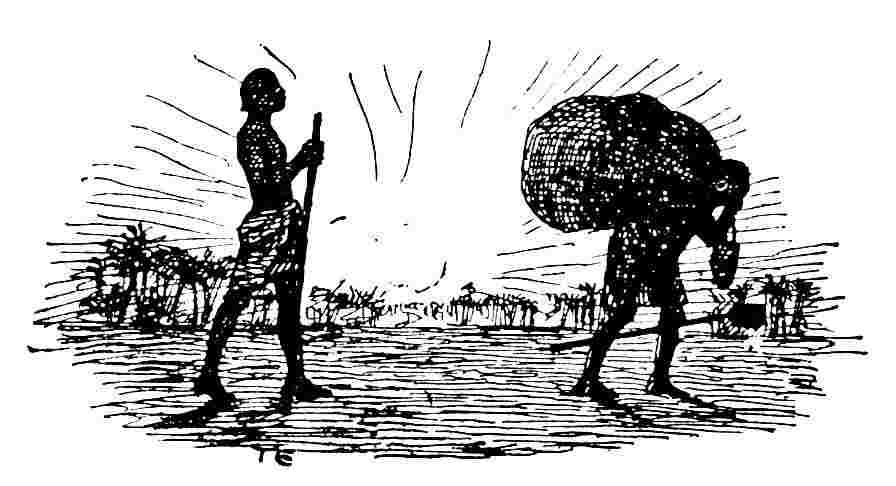
And when the morn was come, they went to the fields with their things; and their hearts were pleased exceedingly with their task in the beginning of their work. And it came to pass after this that as they were in the field they stopped for corn, and he sent his younger brother, saying, "Haste thou, bring to us corn from the farm." And the younger brother found the wife of his elder brother, as she was sitting tiring her hair. He said to her, "Get up, and give to me corn, that I may run to the field, for my elder brother hastened me; do not delay." She said to him, "Go, open the bin, and thou shalt take to thyself according to thy will, that I may not drop my locks of hair while I dress them."
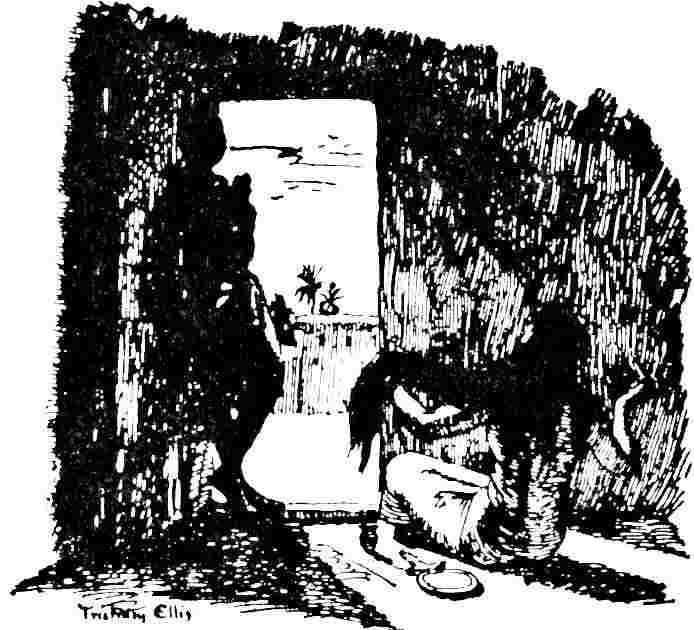
The youth went into the stable; he took a large measure, for he desired to take much corn; he loaded it with wheat and barley; and he went out carrying it. She said to him, "How much of the corn that is wanted, is that which is on thy shoulder?" He said to her, "Three bushels of barley, and two of wheat, in all five; these are what are upon my shoulder:" thus said he to her. And she conversed with him, saying, "There is great strength in thee, for I see thy might every day." And her heart knew him with the knowledge of youth. And she arose and came to him, and conversed with him, saying, "Come, stay with me, and it shall be well for thee, and I will make for thee beautiful garments." Then the youth became like a panther of the south with fury at the evil speech which she had made to him; and she feared greatly. And he spake unto her, saying, "Behold thou art to me as a mother, thy husband is to me as a father, for he who is elder than I has brought me up. What is this wickedness that thou hast said to me? Say it not to me again. For I will not tell it to any man, for I will not let it be uttered by the mouth of any man." He lifted up his burden, and he went to the field and came to his elder brother; and they took up their work, to labour at their task.
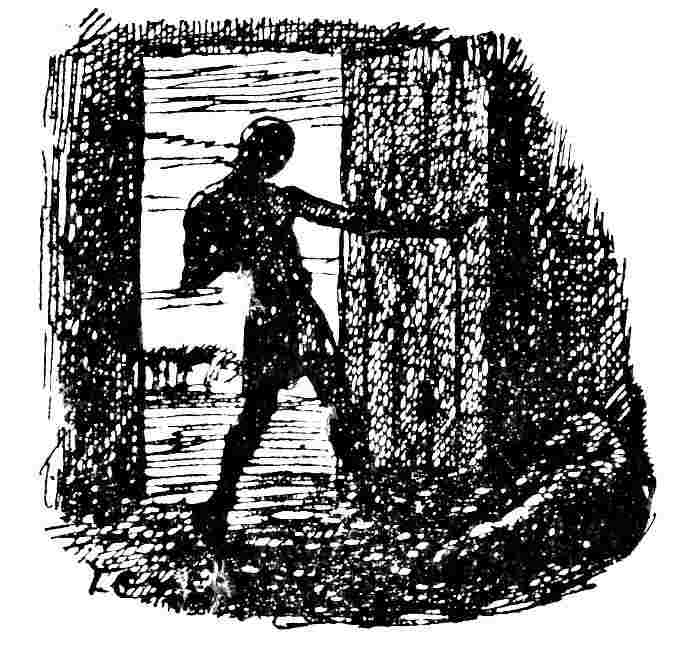
Now afterward, at eventime, his elder brother was returning to his house; and the younger brother was following after his oxen, and he loaded himself with all the things of the field; and he brought his oxen before him, to make them lie down in their stable which was in the farm. And behold the wife of the elder brother was afraid for the words which she had said. She took a parcel of fat, she became like one who is evilly beaten, desiring to say to her husband, "It is thy younger brother who has done this wrong." Her husband returned in the even, as was his wont of every day; he came unto his house; he found his wife ill of violence; she did not give him water upon his hands as he used to have, she did not make a light before him, his house was in darkness, and she was lying very sick. Her husband said to her, "Who has spoken with thee?"
Behold she said, "No one has spoken with me except thy younger brother. When he came to take for thee corn he found me sitting alone; he said to me, 'Come, let us stay together, tie up thy hair:' thus spake he to me. I did not listen to him, but thus spake I to him: 'Behold, am I not thy mother, is not thy elder brother to thee as a father?' And he feared, and he beat me to stop me from making report to thee, and if thou lettest him live I shall die. Now behold he is coming in the evening; and I complain of these wicked words, for he would have done this even in daylight."
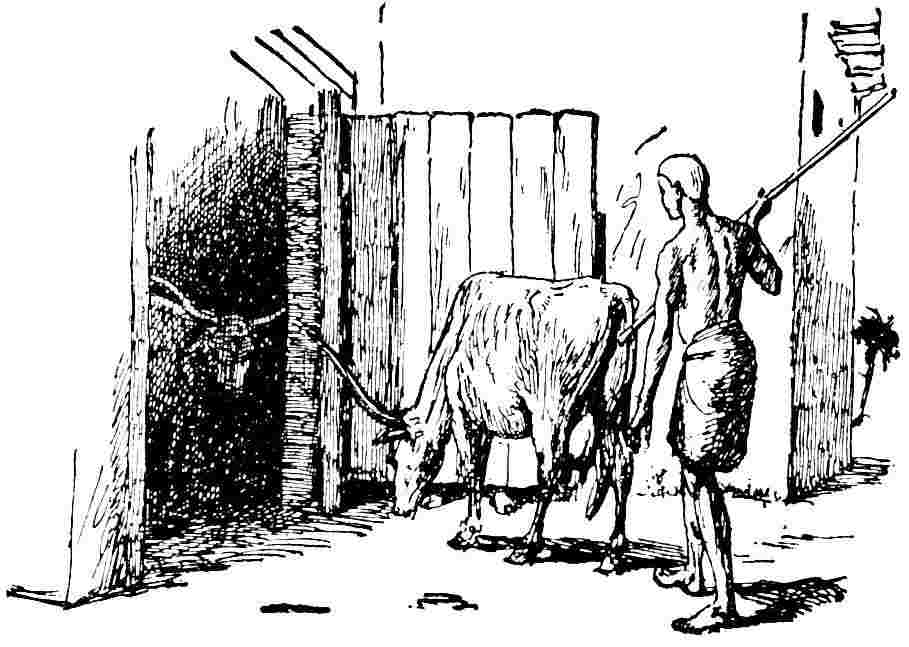
And the elder brother became as a panther of the south; he sharpened his knife; he took it in his hand; he stood behind the door of his stable to slay his younger brother as he came in the evening to bring his cattle into the stable.
Now the sun went down, and he loaded himself with herbs in his daily manner. He came, and his foremost cow entered the stable, and she said to her keeper, "Behold thou thy elder brother standing before thee with his knife to slay thee; flee from before him." He heard what his first cow had said; and the next entering, she also said likewise. He looked beneath the door of the stable; he saw the feet of his elder brother; he was standing behind the door, and his knife was in his hand. He cast down his load to the ground, and betook himself to flee swiftly; and his elder brother pursued after him with his knife. Then the younger brother cried out unto Ra Harakhti, saying, "My good Lord! Thou art he who divides the evil from the good." And Ra stood and heard all his cry; and Ra made a wide water between him and his elder brother, and it was full of crocodiles; and the one brother was on one bank, and the other on the other bank; and the elder brother smote twice on his hands at not slaying him. Thus did he. And the younger brother called to the elder on the bank, saying, "Stand still until the dawn of day; and when Ra ariseth, I shall judge with thee before Him, and He discerneth between the good and the evil. For I shall not be with thee any more for ever; I shall not be in the place in which thou art; I shall go to the valley of the acacia."
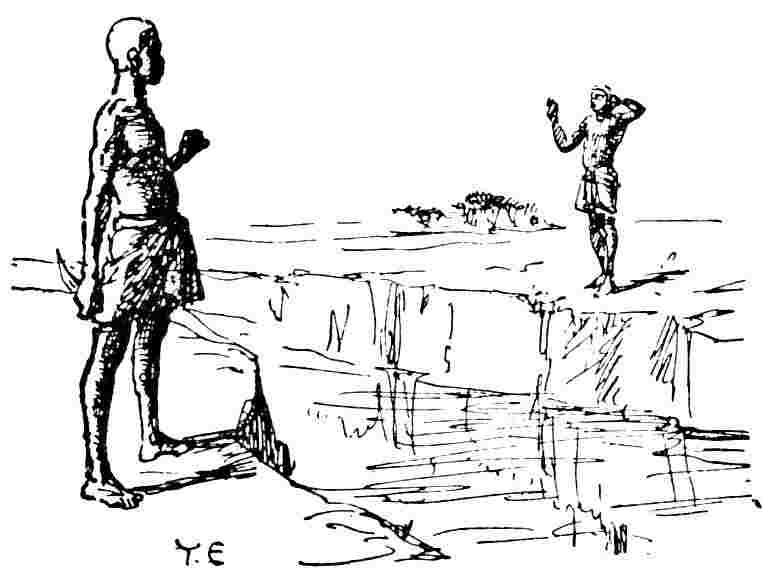
Now when the land was lightened, and the next day appeared, Ra Harakhti arose, and one looked unto the other. And the youth spake with his elder brother, saying, "Wherefore earnest thou after me to slay me in craftiness, when thou didst not hear the words of my mouth? For I am thy brother in truth, and thou art to me as a father, and thy wife even as a mother: is it not so? Verily, when I was sent to bring for us corn, thy wife said to me, 'Come, stay with me;' for behold this has been turned over unto thee into another wise." And he caused him to understand of all that happened with him and his wife. And he swore an oath by Ra Har-akhti, saying, "Thy coming to slay me by deceit with thy knife was an abomination." Then the youth took a knife, and cut off of his flesh, and cast it into the water, and the fish swallowed it. He failed; he became faint; and his elder brother cursed his own heart greatly; he stood weeping for him afar off; he knew not how to pass over to where his younger brother was, because of the crocodiles. And the younger brother called unto him, saying, "Whereas thou hast devised an evil thing, wilt thou not also devise a good thing, even like that which I would do unto thee? When thou goest to thy house thou must look to thy cattle, for I shall not stay in the place where thou art; I am going to the valley of the acacia. And now as to what thou shalt do for me; it is even that thou shalt come to seek after me, if thou perceivest a matter, namely, that there are things happening unto me. And this is what shall come to pass, that I shall draw out my soul, and I shall put it upon the top of the flowers of the acacia, and when the acacia is cut down, and it falls to the ground, and thou comest to seek for it, if thou searchest for it seven years do not let thy heart be wearied. For thou wilt find it, and thou must put it in a cup of cold water, and expect that I shall live again, that I may make answer to what has been done wrong.. And thou shalt know of this, that is to say, that things are happening to me, when one shall give to thee a cup of beer in thy hand, and it shall be troubled; stay not then, for verily it shall come to pass with thee."
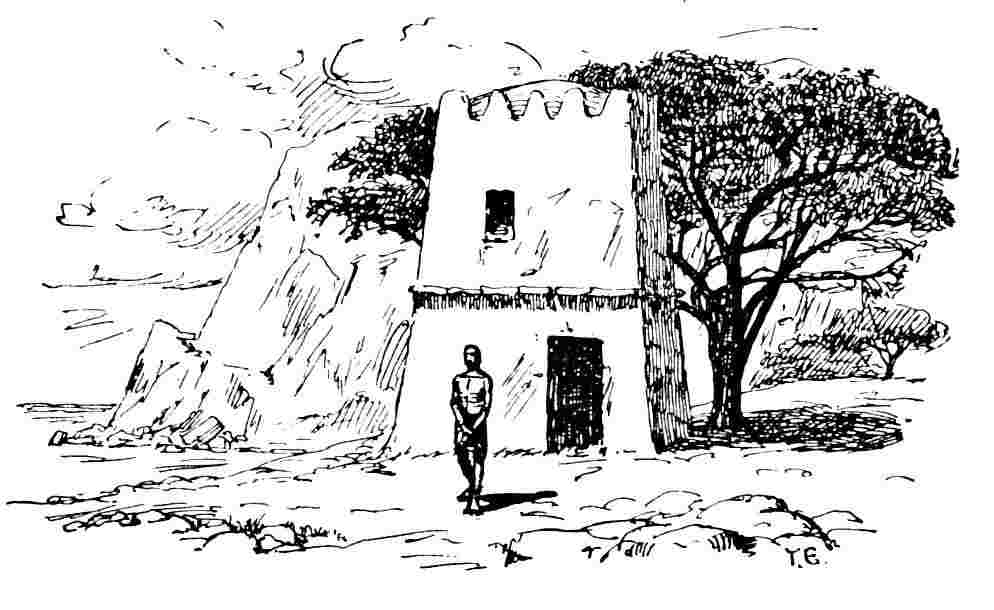
And the youth went to the valley of the acacia; and his elder brother went unto his house; his hand was laid on his head, and he cast dust on his head; he came to his house, and he slew his wife, he cast her to the dogs, and he sat in mourning for his younger brother.
Now many days after these things, the younger brother was in the valley of the acacia; there was none with him; he spent his time in hunting the beasts of the desert, and he came back in the even to lie down under the acacia, which bore his soul upon the topmost flower. And after this he built himself a tower with his own hands, in the valley of the acacia; it was full of all good things, that he might provide for himself a home.
And he went out from his tower, and he met the Nine Gods, who were walking forth to look upon the whole land. The Nine Gods talked one with another, and they said unto him, "Ho! Bata, bull of the Nine Gods, art thou remaining alone? Thou hast left thy village for the wife of Anpu, thine elder brother. Behold his wife is slain. Thou hast given him an answer to all that was transgressed against thee." And their hearts were vexed for him exceedingly. And Ra Harakhti said to Khnumu, "Behold, frame thou a woman for Bata, that he may not remain alive alone." And Khnumu made for him a mate to dwell with him.
She was more beautiful in her limbs than any woman who is in the whole land. The essence of every god was in her. The seven Hathors came to see her: they said with one mouth, "She will die a sharp death."
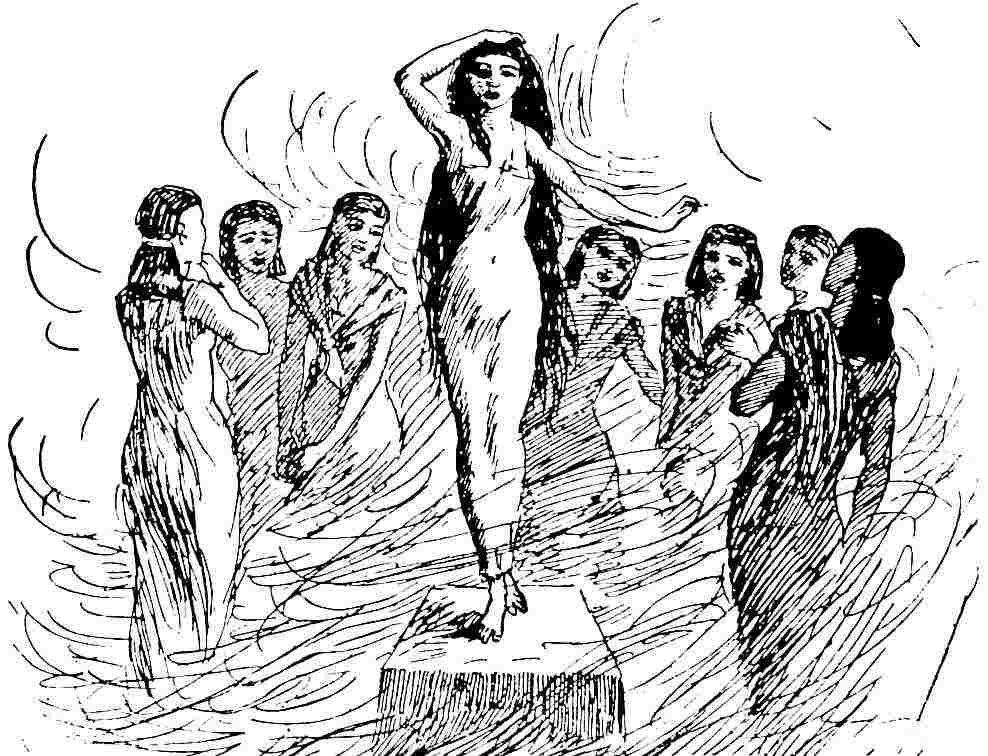
And Bata loved her very exceedingly, and she dwelt in his house; he passed his time in hunting the beasts of the desert, and brought and laid them before her. He said, "Go not outside, lest the sea seize thee; for I cannot rescue thee from it, for I am a woman like thee; my soul is placed on the head of the flower of the acacia; and if another find it, I must fight with him." And he opened unto her his heart in all its nature.
Now after these things Bata went to hunt in his daily manner. And the young girl went to walk under the acacia which was by the side of her house. Then the sea saw her, and cast its waves up after her. She betook herself to flee from before it. She entered her house. And the sea called unto the acacia, saying, "Oh, would that I could seize her!" And the acacia brought a lock from her hair, and the sea carried it to Egypt, and dropped it in the place of the fullers of Pharaoh's linen. The smell of the lock of hair entered into the clothes of Pharaoh; and they were wroth with the fullers of Pharaoh, saying, "The smell of ointment is in the clothes of Pharaoh." And the people were rebuked every day, they knew not what they should do.
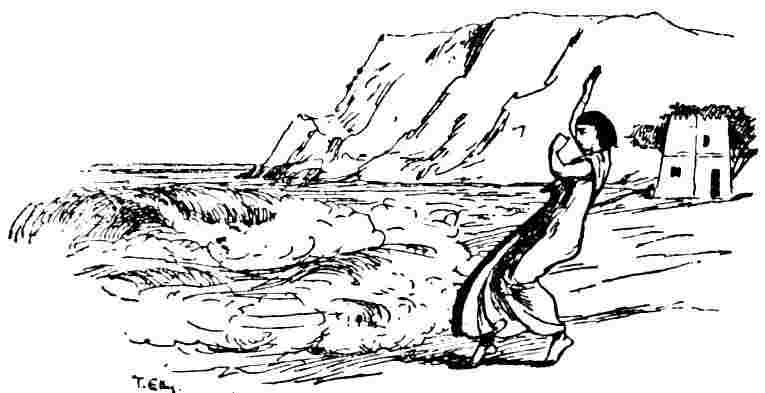 And the chief fuller of Pharaoh walked by the bank, and his heart was very evil within him after the daily quarrel with him. He stood still, he stood upon the sand opposite to the lock of hair, which was in the water, and he made one enter into the water and bring it to him; and there was found in it a smell, exceeding sweet. He took it to Pharaoh; and they brought the scribes and the wise men, and they said unto Pharaoh, "This lock of hair belongs to a daughter of Ra Harakhti: the essence of every god is in her, and it is a tribute to thee from another land. Let messengers go to every strange land to seek her: and as for the messenger who shall go to the valley of the acacia, let many men go with him to bring her." Then said his majesty, "Excellent exceedingly is what has been said to us;" and they sent them. And many days after these things the people who were sent to strange lands came to give report unto the king: but there came not those who went to the valley of the acacia, for Bata had slain them, but let one of them return to give a report to the king. His majesty sent many men and soldiers, as well as horsemen, to bring her back. And there was a woman amongst them, and to her had been given in her hand beautiful ornaments of a woman. And the girl came back with her, and they rejoiced over her in the whole land.
And the chief fuller of Pharaoh walked by the bank, and his heart was very evil within him after the daily quarrel with him. He stood still, he stood upon the sand opposite to the lock of hair, which was in the water, and he made one enter into the water and bring it to him; and there was found in it a smell, exceeding sweet. He took it to Pharaoh; and they brought the scribes and the wise men, and they said unto Pharaoh, "This lock of hair belongs to a daughter of Ra Harakhti: the essence of every god is in her, and it is a tribute to thee from another land. Let messengers go to every strange land to seek her: and as for the messenger who shall go to the valley of the acacia, let many men go with him to bring her." Then said his majesty, "Excellent exceedingly is what has been said to us;" and they sent them. And many days after these things the people who were sent to strange lands came to give report unto the king: but there came not those who went to the valley of the acacia, for Bata had slain them, but let one of them return to give a report to the king. His majesty sent many men and soldiers, as well as horsemen, to bring her back. And there was a woman amongst them, and to her had been given in her hand beautiful ornaments of a woman. And the girl came back with her, and they rejoiced over her in the whole land.
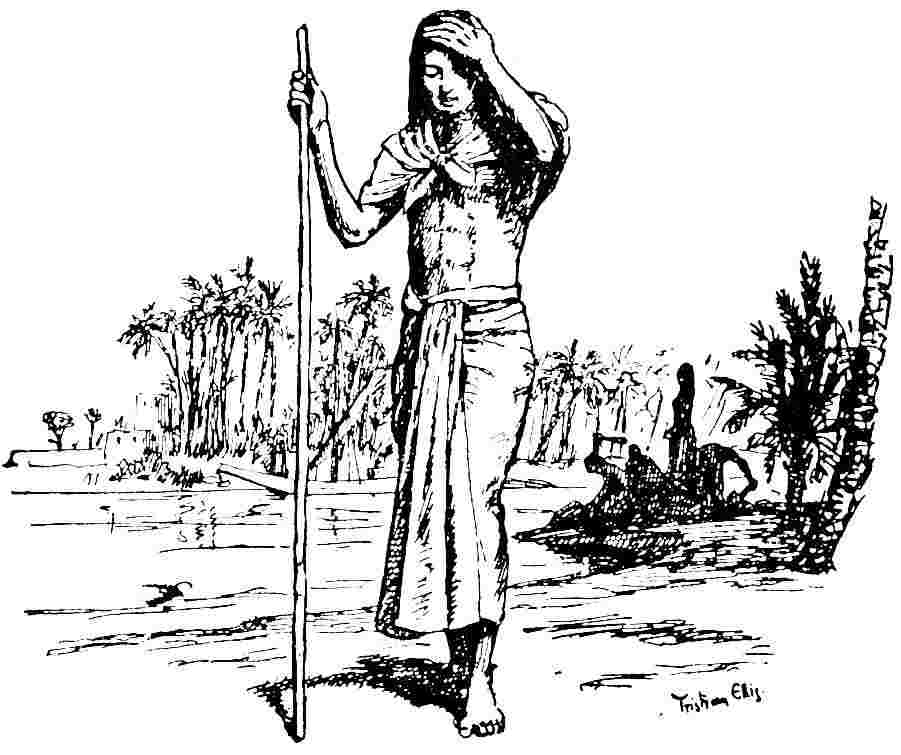
And his majesty loved her exceedingly, and raised her to high estate; and he spake unto her that she should tell him concerning her husband. And she said, "Let the acacia be cut down, and let one chop it up." And they sent men and soldiers with their weapons to cut down the acacia; and they came to the acacia, and they cut the flower upon which was the soul of Bata, and he fell dead suddenly.
And when the next day came, and the earth was lightened, the acacia was cut down. And Anpu, the elder brother of Bata, entered his house, and washed his hands; and one gave him a cup of beer, and it became troubled; and one gave him another of wine, and the smell of it was evil. Then he took his staff, and his sandals, and likewise his clothes, with his weapons of war; and .he betook himself forth to the valley of the acacia. He entered the tower of his younger brother, and he found him lying upon his mat; he was dead. And he wept when he saw his younger brother verily lying dead. And he went out to seek the soul of his younger brother under the acacia tree, under which his younger brother lay in the evening.
He spent three years in seeking for it, but found it not. And when he began the fourth year, he desired in his heart to return into Egypt; he said "I will go to-morrow morn:" thus spake he in his heart.
Now when the land lightened, and the next day appeared, he was walking under the acacia; he was spending his time in seeking it. And he returned in the evening, and laboured at seeking it again. He found a seed. He returned with it. Behold this was the soul of his younger brother. He brought a cup of cold water, and he cast the seed into it: and he sat down, as he was wont. Now when the night came his soul sucked up the water; Bata shuddered in all his limbs, and he looked on his elder brother; his soul was in the cup. Then Anpu took the cup of cold water, in which the soul of his younger brother was; Bata drank it, his soul stood again in its place, and he became as he had been. They embraced each other, and they conversed together.
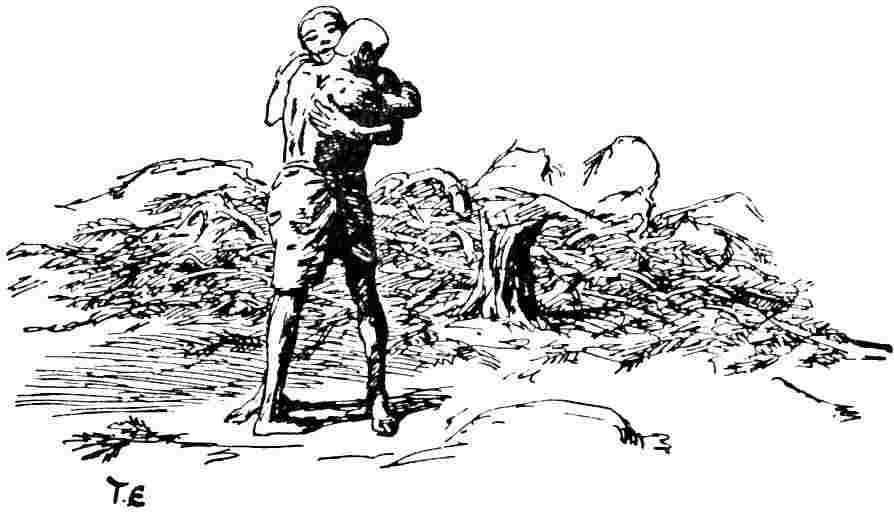
And Bata said to his elder brother, "Behold I am to become as a great bull, which bears every good mark; no one knoweth its history, and thou must sit upon my back. When the sun arises I shall be in the place where my wife is, that I may return answer to her; and thou must take me to the place where the king is. For all good things shall be done for thee; for one shall lade thee with silver and gold, because thou bringest me to Pharaoh, for I become a great marvel, and they shall rejoice for me in all the land. And thou shalt go to thy village."
And when the land was lightened, and the next day appeared, Bata became in the form which he had told to his elder brother. And Anpu sat upon his back until the dawn. He came to the place where the king was, and they made his majesty to know of him; he saw him, and he was exceeding joyful with him. He made for him great offerings, saying,
"This is a great wonder which has come to pass." There were rejoicings over him in the whole land. They presented unto him silver and gold for his elder brother, who went and stayed in his village. They gave to the bull many men and many things, and Pharaoh loved him exceedingly above all that is in this land.
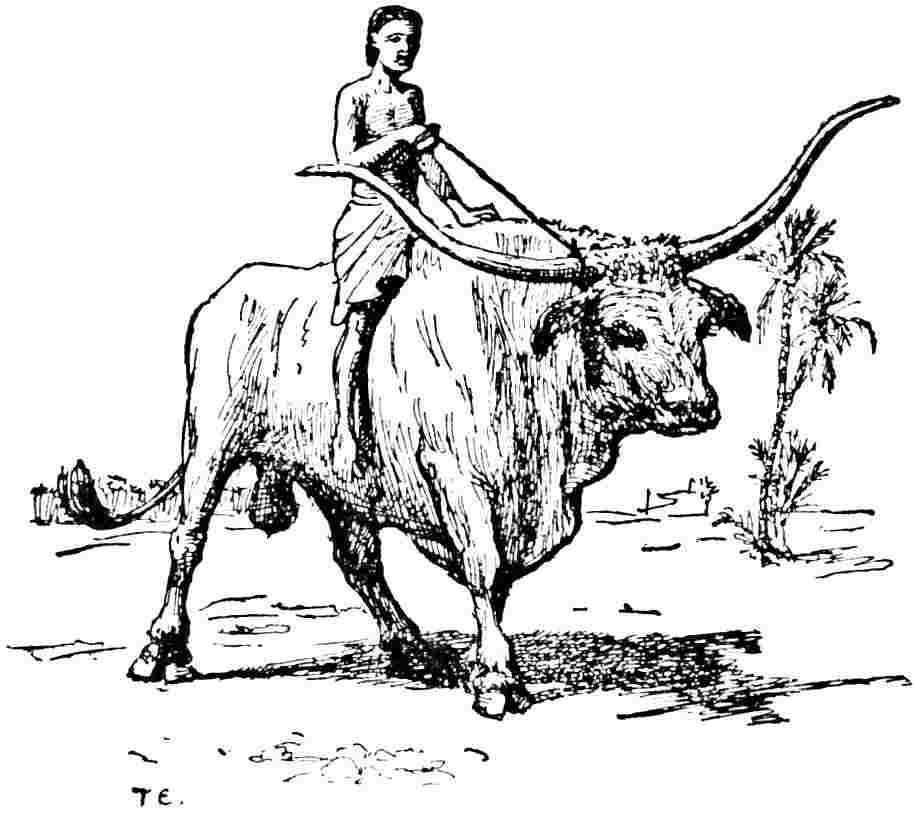
And after many days after these things, the bull entered the purified place; he stood in the place where the princess was; he began to speak with her, saying, "Behold, I am alive indeed." And she said to him, "And, pray, who art thou?" He said to her, "I am Bata. I perceived when thou causedst that they should destroy the acacia of Pharaoh, which was my abode, that I might not be suffered to live. Behold, I am alive indeed, I am as an ox." Then the princess feared exceedingly for the words that her husband had spoken to her. And he went out from the purified place.
And his majesty was sitting, making a good day with her: she was at the table of his majesty, and the king was exceeding pleased with her. And she said to his majesty, "Swear to me by God, saying, 'What thou shalt say, I will obey it for thy sake.'" He hearkened unto all that she said, even this. "Let me eat of the liver of the ox, because he is fit for nought:" thus spake she to him. And the king was exceeding sad at her words, the heart of Pharaoh grieved him greatly. And after the land was lightened, and the next day appeared, they proclaimed a great feast with offerings to the ox. And the king sent one of the chief butchers of his majesty, to cause the ox to be sacrificed. And when he was sacrificed, as he was upon the shoulders of the people, he shook his neck, and he threw two drops of blood over against the two doors of his majesty. The one fell upon the one side, on the great door of Pharaoh, and the other upon the other door. They grew as two great Persea trees, and each of them was excellent.
And one went to tell unto his majesty, "Two great Persea trees have grown, as a great marvel of his majesty, in the night by the side of the great gate of his majesty." And there was rejoicing for them in all the land, and there were offerings made to them.
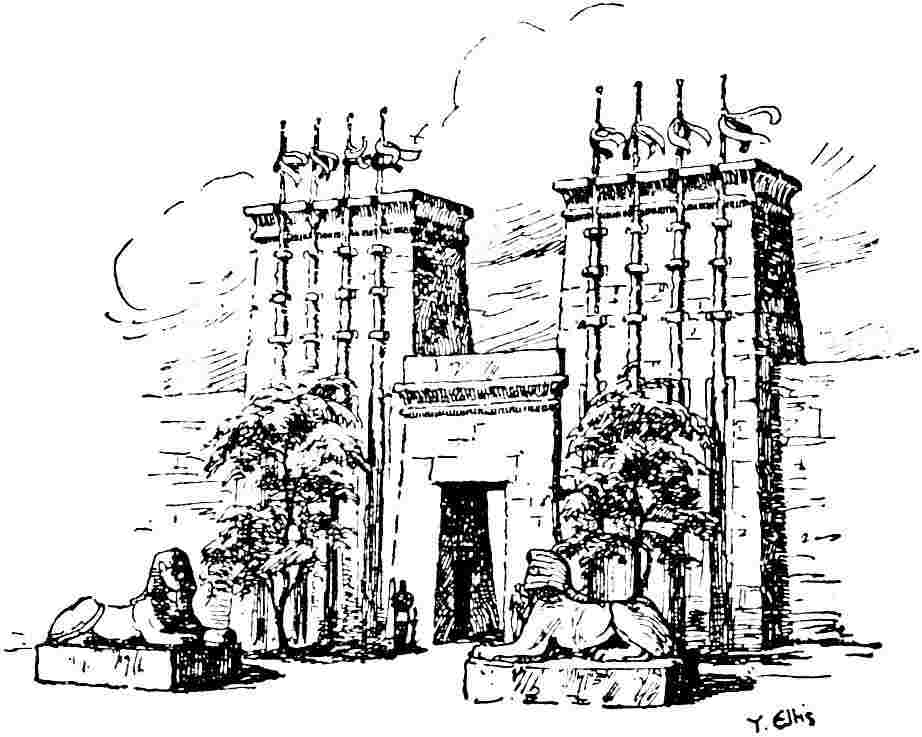
And when the days were multiplied after these things, his majesty was adorned with the blue crown, with garlands of flowers on his neck, and he was upon the chariot of pale gold, and he went out from the palace to behold the Persea trees: the princess also was going out with horses behind his majesty. And his majesty sat beneath one of the Persea trees, and it spake thus with his wife: "Oh thou deceitful one, I am Bata, I am alive, though I have been evilly entreated. I knew who caused the acacia to be cut down by Pharaoh at my dwelling. I then became an ox, and thou causedst that I should be killed."
And many days after these things the princess stood at the table of Pharaoh, and the king was pleased with her. And she said to his majesty, "Swear to me by God, saying, 'That which the princess shall say to me I will obey it for her.'" And he hearkened unto all she said. And he commanded, "Let these two Persea trees be cut down, and let them be made into goodly planks." And he hearkened unto all she said. And after this his majesty sent skilful craftsmen, and they cut down the Persea trees of Pharaoh; and the princess, the royal wife, was standing looking on, and they did all that was in her heart unto the trees. But a chip flew up, and it entered into the mouth of the princess; she swallowed it, and after many days she bore a son. And one went to tell his majesty, "There is born to thee a son." And they brought him, and gave to him a nurse and servants; and there were rejoicings in the whole land. And the king sat making a merry day, as they were about the naming of him, and his majesty loved him exceedingly at that moment, and the king raised him to be the royal son of Kush.
Now after the days had multiplied after these things, his majesty made him heir of all the land. And many days after that, when he had fulfilled many years as heir, his majesty flew up to heaven. And the heir said, "Let my great nobles of his majesty be brought before me, that I may make them to know all that has happened to me." And they brought also before him his wife, and he judged with her before him, and they agreed with him. They brought to him his elder brother; he made him hereditary prince in all his land. He was thirty years king of Egypt, and he died, and his elder brother stood in his place on the day of burial.
Excellently finished in peace, for the ka of the scribe of the treasury Kagabu, of the treasury of Pharaoh, and for the scribe Hora, and the scribe Meremapt. Written by the scribe Anena, the owner of this roll. He who speaks against this roll, may Tahuti smite him.
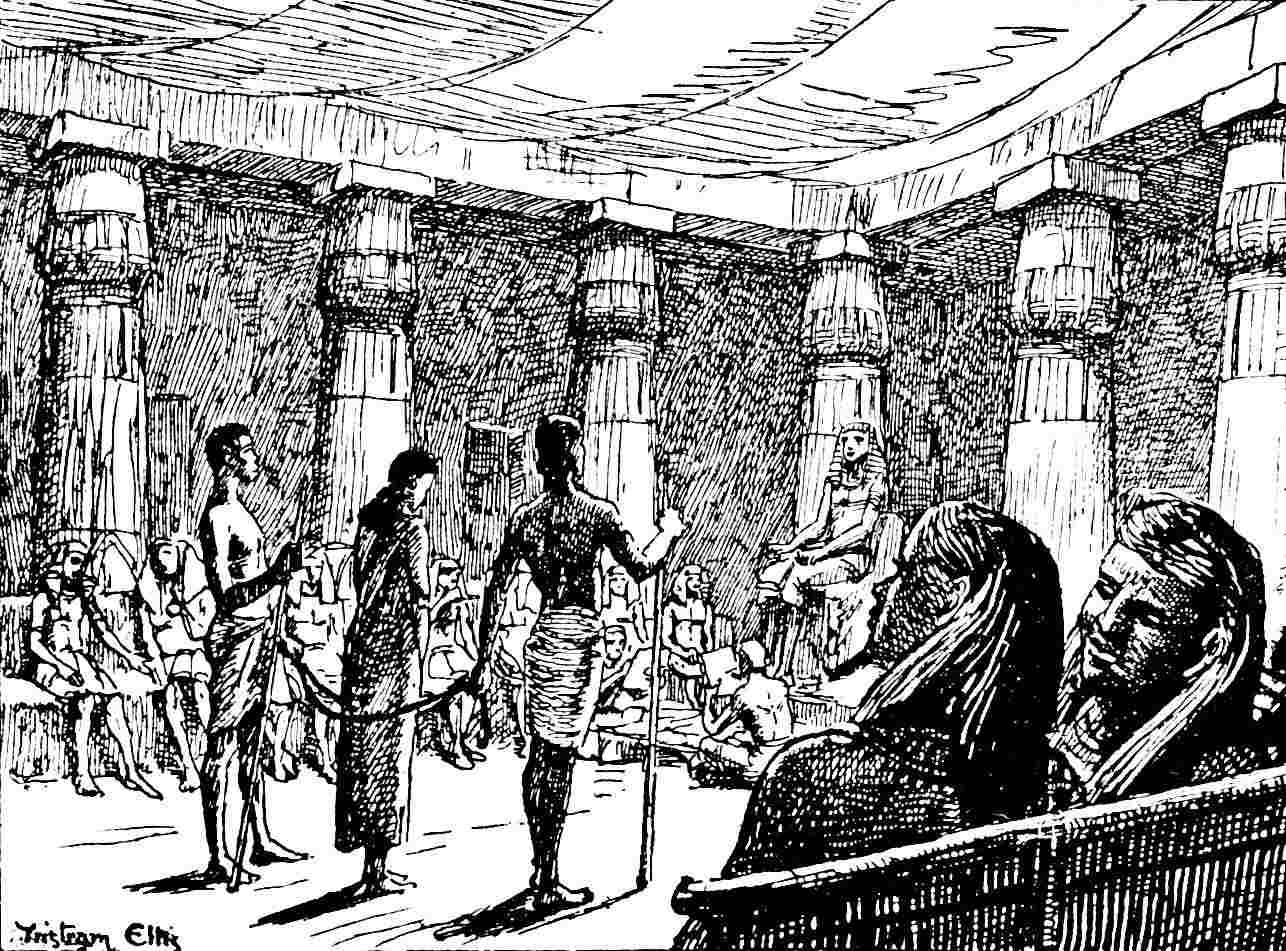
Return to top.
Remarks
This tale, which is perhaps, of all this series, the best known in modern times, has often been published. It exists only in one papyrus, that of Madame d'Orbiney, purchased by the British Museum in 1857. The papyrus had belonged to Sety II. when crown prince, and hence is of the XIXth Dynasty. Most of the great scholars of this age have worked at it: De Rouge, Goodwin, Renouf, Chabas, Brugsch, Ebers, Maspero, and Groff have all made original studies on it. The present translation is, however, a fresh one made by Mr. Griffith word for word, and shaped as little as possible by myself in editing it. The copy followed is the publication by Birch in "Select Papyri," part ii. pls. ix. to xix. Before considering the details of the story, we should notice an important question about its age and composition. That it is as old as the XIXth Dynasty in its present form is certain from the papyrus; but probably parts of it are older. The idyllic beauty of the opening of it, with the simplicity and directness of the ideas, and the absence of any impossible or marvellous feature, is in the strongest opposition to the latter part, where marvel is piled on marvel in pointless profusion. In the first few pages there is not a word superfluous or an idea out of place in drawing the picture. That we have to do with an older story lengthened out by some inartistic compiler, seems only too probable. And this is borne out by the colophon. In the tales of the Shipwrecked Sailor, and of Sanehat, the colophon runs—"This is finished from beginning to end, even as it was found in the writing," and the earlier of these two tales follows this with a blessing on the transcriber. But, apparently conscious of his meddling, the author of Anpu and Bata ends with a curse: "Written by the scribe Anena, the owner of this roll. He who speaks against this roll, may Tahuti smite him." This points to a part of it at least being newly composed in Ramesside times; while the delicate beauty of the opening is not only far better than the latter part, but is out of harmony with the forced and artificial taste of the XIXth Dynasty. At the same time, the careful drawing of character is hardly akin to the simple, matter-of-fact style of Sanehat, and seems more in keeping with the emotional style of the Doomed Prince. If we attribute the earlier part to the opening of the XVIIIth Dynasty—the age of the pastoral scenes of the tombs of El Kab, which are the latest instances of such sculptures in Egypt—we shall probably be nearest to the truth.
The description of Bata is one of the most beautiful character-drawings in the past. The self-denial and sweet innocence of the lad, his sympathy with his cattle, "listening to all that they said," and allowing them their natural wishes and ways, is touchingly expressed. And those who know Egypt will know that Bata still lives there—several Batas I have known myself. His sweetness of manner, his devotion, his untiringly earnest work, his modesty, his quietness, makes Bata to be one of the most charming friends. Bata I have met in many places, Bata I have loved as one of the flowers of human nature, and Bata I hope often to meet again in divers forms and varied incarnations among the fellah lads of Egypt.
The touches of description of Bata are slight, and yet so pointed. His growing to be an excellent worker; his return at evening laden with all the produce, just as may be seen now any evening as the lads come in bearing on their backs large bundles of vegetables for the house, and of fodder for the home-driven cattle; his sleeping with his cattle in the stable; his zeal in rising before dawn to make the daily bread for his brother, ready to give him when he arose; and then his driving out the cattle to pasture—all contrasts with his elder brother's life of ease. The making of the bread was rightly the duty of Anpu's wife; she ought to have risen to grind the corn long before dawn, as the millstones may now be heard grinding in the dark, morning by morning; she ought to have baked the bread ready for the toiler who spent his whole day in the field. But it was the ever-willing Bata who did the work of the house as well as the work of the farm. "Behold the spirit of a god was in him."
The driving in of the cattle at night is still a particular feature of Egyptian life. About an hour before sunset the tether ropes are drawn in the fields, and the cattle file off, with a little child for a leader—if any; the master gathers up the produce that is required, some buffalo is laden with a heap of clover, or a lad carries it on his back, for the evening feed of the cattle, and all troop along the path through the fields and by the canal. For two or three miles the road becomes more and more crowded with the flocks driven into it from every field, a long haze of dust lies glowing in the crimson glory of sunset over the stream of cows and buffaloes, sheep and goats, that pour into the village. Each beast well knows his master and his crib, and turns in at the familiar gate to the stable under the house, or by the side of the hut; and there all spend the night. Not a hoof is left out in the field; the last belated stragglers come in while the gleam of amber still edges the night-blue sky behind the black horizon. Then the silent fields lie under the brightening moon, glittering with dew, untrodden and deserted. It is not cold or climate that leads men to this custom, but the unsafety of a country bordered by unseen deserts, whence untold men may suddenly appear and ravage all the plain.
The ploughing scene next follows, on "the land coming out from the water"; as the inundation goes down the well-known banks and ridges appear, "the back-bones of the land," as they were so naturally called; and when the surface is firm enough to walk on—with many a pool and ditch still full—the ploughing begins on the soft dark clay.
The catastrophe of the story—the black gulf of deceit that suddenly opens under Bata's feet—has always been seen to be strikingly like the story of Joseph. And—as we have noticed—there is good reason for the early part of this tale belonging to about the beginning of the XVIIIth Dynasty, so it is very closely allied in time as well as character to the account of Joseph. In this part again is one of those pointed touches, which show the power of the poet—for a poem in prose this is—"her heart knew him with the knowledge of youth."
On reaching the mistaken revenge of Anpu, we see the sympathy of Bata with his cattle, and his way of reading their feelings, returned to him most fittingly by the cows perceiving the presence of the treachery. "He heard what his first cow had said; and the next entering she also said likewise."
After this we find a change; instead of the simple and natural narrative, full of human feeling, and without a touch of impossibility, every subsequent episode involves the supernatural; Ra creating a wide water, the extraction of the soul of Bata, his miraculous wife, and all the transformations—these have nothing in common with the style or ideas of the earlier tale.
Whence this later tangle came, and how much of it is drawn from other sources, we can hardly hope to explain from the fragments of literature that we have. But strangely there is a parallel which is close enough to suggest that the patchwork is due to popular mythology. In the myths of Phrygia we meet with Atys or Attis, of whom varying legends are told. Among these we glean that he was a shepherd, beautiful and chaste; that he fled from corruption; that he mutilated himself; lastly he died under a tree, and afterwards was revived. All this is a duplicate of the story of Bata. And looking further, we see parallels to the three subsequent transformations. Drops of blood were shed from the Atys-priest; and Bata, in his first transformation as a bull, sprinkles two drops of blood by the doors of the palace. Again, Atys is identified with a tree, which was cut down and taken into a sanctuary; and Bata in his second transformation is a Persea tree which is cut down and used in building. Lastly, the mother of Atys is said to have been a virgin, who bore him from placing in her bosom a ripe almond or pomegranate; and in his third transformation Bata is born from a chip of a tree being swallowed by the princess. These resemblances in nearly all the main points are too close and continuous to be a mere chance, especially as such incidents are not found in any other Egyptian tale, nor in few—if any—other classical myths. It is not impossible that the names even may have been the same; for Bata, as we write it, was pronounced Vata (or Vatiu or Vitiou, as others would vocalise it), and the digamma would disappear in the later Greek form in which we have Atys.
The most likely course seems to have been that, starting with a simple Egyptian tale, the resemblance to the shepherd of the Asiatic myth, led to a Ramesside author improving the story by tacking on the branches of the myth one after another, and borrowing the name. If this be granted, we have here in Bata the earliest indications of the elements of the Atys mysteries, a thousand years before the Greek versions.
Returning now from the general structure to the separate incidents, we note the expression of annoyance where the elder brother "smote twice on his hands." This gesture is very common in Egypt now, the two hands being rapidly slid one past the other, palm to palm, vertically, grating the fingers of one hand over the other; the right hand moving downwards, and the left a little up. This implies that there is nothing, that a thing is worthless, that a desired result has not been attained, or annoyance at want of success; but the latter meanings are now rare, and more latent than otherwise, and this tale points to the gesture being originally one of positive anger, though it has been transferred gradually to express mere negative results.
The valley of the acacia would appear from the indications to have been by the sea, and probably in Syria; perhaps one of the half-desert wadis toward Gaza was in the writer's mind. The idea of Bata taking out his heart, and placing it on the flower of a tree, has seemed hopelessly unintelligible. But it depends on what we are to understand by the heart in Egyptian. Two words are well known for it, hati and ah; and as it is unlikely that these should be mere synonyms, we have a presumption that one of them does not mean the physical heart, but rather the mental heart. We are accustomed to the same mixture of thought; and far the more common usage in English is not to employ the name to express the physical heart, but for the will, as when we say "good-hearted";—for the spring of action, "broken-hearted ";—for the feelings, "hard-hearted";—for the passions, "an affair of the heart";—or for the vigour, as when a man in nature or in act is "hearty" The Egyptian, with his metaphysical mind, took two different words where we only use one; and when we read of placing the heart (hati) out of a man, we are led at once by the analogy of beliefs in other races to understand this as the vitality or soul. In the "Golden Bough" Mr. Frazer has explained this part of natural metaphysics; and in this, and the following points, I freely quote from that work as a convenient text-book. The soul or vitality of a man is thought of as separable from the body at will, and therefore communicable to other objects or positions. In those positions it cannot be harmed by what happens to the body, which is therefore deathless for the time. But if the external seat of the soul be attacked or destroyed, the man immediately dies. This is illustrated from the Norse, Saxons, Celts, Italians, Greeks, Kabyles, Arabs, Hindus, Malays, Mongolians, Tartars, Magyars, and Slavonians. It may well, then, be considered as a piece of inherent psychology: and following this interpretation, I have rendered "heart" in this sense "soul" in the translation.
The Nine Gods who meet Bata are one of the great cycles of divinities, which were differently reckoned in various places. Khnumu is always the formative god, who makes man upon the potter's wheel, as in the scene in the temple of Luqsor. And even in natural birth it was Khnumu who "gave strength to the limbs," as in the earlier "Tales of the Magicians." The character of the wife of Bata is a very curious study. The total absence of the affections in her was probably designed as in accord with her non-natural formation, as she could not inherit aught from human parents. Ambition appears as the only emotion of this being; her attacks on the transformations of Bata are not due to dislike, but only to fear that he should claim her removal from her high station; she "feared exceedingly for the words that her husband had spoken to her." Her Lilith nature is incapable of any craving but that for power.
The action here of the seven Hathors we have noticed in the remarks on the previous tale of the Doomed Prince. The episode of the sea is very strange; and if we need find some rationalising account of it, we might suppose it to be a mythical form of a raid of pirates, who, not catching the woman, carried off something of hers, which proved an object of contention in Egypt. But such renderings are unlikely, and we may the rather expect to find some explanation in a mythological parallel.
The carrying of the lock of hair to Pharaoh, and his proclaiming a search for the owner, is plainly an early form of the story of the little slipper, whose owner is sought by the king. The point that she could not be caught except by setting another woman to tempt her with ornaments, anticipates the modern novelist's saying, "Set a woman to catch a woman."
The sudden death of Bata, so soon as the depository of his soul was destroyed, is a usual feature in such tales about souls. But it is only in the Indian forms quoted by Mr. Frazer that there is any revival of the dead; and in no case is there any transformation like that of Bata. Perhaps none but an Egyptian or a Chinese would have credited Anpu with wandering up and down for four years seeking the lost soul. But the idea of returning the soul in water to the man is found as a magic process in North America ("Golden Bough," i. 141).
The first transformation of Bata, into a bull, is clearly drawn from the Apis bull of Memphis. The rejoicings at discovering a real successor of Apis are here, the rejoicings over Bata, who is the Apis bull, distinguished as he says by "bearing every good mark." These marks on the back and other parts were the tokens of the true Apis, who was sought for anxiously through the country on the death of the sacred animal who had lived in the sanctuary. The man who, like Anpu, brought up a true Apis to the temple would receive great rewards and honours.
The scene where the princess demands the grant of a favour is repeated over again by Esther at her banquet, and by the daughter of Herodias. It is the Oriental way of doing business. But the curious incongruity of making a great feast with offerings to the ox before sacrificing it, appears inexplicable until we note the habits of other peoples in slaying their sacred animals at certain intervals. This tale shows us what is stated by Greek authors, that the Egyptians slew the sacred Apis at stated times, or when a new one was discovered with the right marks. The annual sacrifice of a sacred ram at Thebes shows that the Egyptians were familiar with such an idea. And though it was considered by the writer of this tale as a monstrous act, yet the offerings and festivity which accompanied it are in accordance with the strange fact found by Mariette, that in the three undisturbed Apis burials which he discovered there were only fragments of bone, and in one case a head, carefully embalmed with bitumen and magnificent offerings of jewellery. The divine Apis was eaten as a sacred feast.
The reason that the princess desires the liver is strangely explained by a present belief on the Upper Nile. The Darfuris think that the liver is the seat of the soul ("Golden Bough," ii. 88); and hence if she ate the liver she would destroy the soul of Bata, or prevent it entering any other incarnation.
The next detail is also curiously significant. If a bull was being sacrificed we should naturally suppose the blood would flow, and that a few drops would not be noticed. Here, however, two drops are said to fall, and this was when the bull "was upon the shoulders of the people." Now it is a very general idea that blood must not be allowed to fall upon the ground; the eastern and southern Africans will not shed the blood of cattle ("Golden Bough," i. 182); and strangely the Australians avoid the falling of blood to the ground by placing the bleeding persons upon the shoulders of other men. This parallel is so close to the Egyptian tale that it seems as if the bull was borne "on the shoulders of the people," that his blood should not fall to the ground; yet in spite of this precaution "he shook his neck, and he threw two drops of blood over against the doors of his majesty." In these drops of blood was the soul of Bata, in spite of the princess having eaten his liver; and we know how among Jews, Arabs, and other peoples, the blood is regarded as the vehicle of the soul or life.
The evidence of tree worship is plainer here than perhaps in any other passage of Egyptian literature. The people rejoice for the two Persea trees, "and there were offerings made to them."
The blue crown worn by the king was the war cap of leather covered with scales of copper: it is often found made in dark blue glaze for statuettes, and it seems probable that the copper was superficially sulphurised to tint it. Such head-dress was usually worn by kings when riding in their chariots. The pale gold or electrum here mentioned was the general material for decorating the royal chariot.
The miraculous birth of Bata in his third transformation is, as we have noticed, closely paralleled by the birth of Atys from the almond. The idea at the root of this is that of self-creation or self-existence, as in the usual Egyptian phrase, "bull of his mother."
The king flying up to heaven is a regular expression for his death: "the hawk has soared," "the follower of the god has met his maker," so Sanehat describes it (see ist series, pp. 97, 98).
This hawk-form of the king may be connected with the hawk bearing the double crown which is perched on the top of the ka name of each king. That hawk is not Horus, nor even the king deified as Horus, because the emblem of life is given to it by other gods (as by Set on a lintel of XVIIIth Dynasty from Nubt), and therefore the hawk is the human king who could perish, and not an immortal divinity. Further, this hawk-king is always perched on the top of the drawing of the doorway to the sepulchre which bears the ka name of the king; and when we see the drawings of the ba bird or soul flying down the well to the sepulchre, it appears as if the hawk were the royal ba bird (ordinary men having a ba bird with a human head); and that the well-known first title of each king represents the royal soul or ba bird perched on the door of the sepulchre, resting on his way to and from the visit to the corpse below. The soul or ba of the king at his death thus flew away as a hawk to meet the sun.
The veil drawn over the fate of the inhuman princess is well conceived. That she should die a sharp death has been foretold; but how Bata should slay the divine creation—his wife—his mother—is a matter that the scribe reserves in silence; we only read that "he judged with her before him, and the great nobles agreed with him." That judgment is best left among the things unwritten,
The strange manner in which we can see incident after incident in the latter part of the tale, each to refer to some ceremony or belief, even imperfect as our knowledge of such must be, and the evidence that the whole being of Bata is a transference of the myth of Atys, must lead us to look on this, the marvellous portion, as woven out of a group of myths, ceremonies, and beliefs which were joined and explained by the formation of such a tale. How far it is due to purely Egyptian ideas, indicated by the Apis bull and the analogies in present African beliefs, and how far it is Asiatic and belonging to Atys, it would be premature to decide. But from the weird confusion and mystery of these transformations, we turn back with renewed pleasure to the simple and sweet picture of peasant life, and the beauty of Bata, and we see how true a poet the Egyptian was in feeling and in expression.
Return to top.
 And the chief fuller of Pharaoh walked by the bank, and his heart was very evil within him after the daily quarrel with him. He stood still, he stood upon the sand opposite to the lock of hair, which was in the water, and he made one enter into the water and bring it to him; and there was found in it a smell, exceeding sweet. He took it to Pharaoh; and they brought the scribes and the wise men, and they said unto Pharaoh, "This lock of hair belongs to a daughter of Ra Harakhti: the essence of every god is in her, and it is a tribute to thee from another land. Let messengers go to every strange land to seek her: and as for the messenger who shall go to the valley of the acacia, let many men go with him to bring her." Then said his majesty, "Excellent exceedingly is what has been said to us;" and they sent them. And many days after these things the people who were sent to strange lands came to give report unto the king: but there came not those who went to the valley of the acacia, for Bata had slain them, but let one of them return to give a report to the king. His majesty sent many men and soldiers, as well as horsemen, to bring her back. And there was a woman amongst them, and to her had been given in her hand beautiful ornaments of a woman. And the girl came back with her, and they rejoiced over her in the whole land.
And the chief fuller of Pharaoh walked by the bank, and his heart was very evil within him after the daily quarrel with him. He stood still, he stood upon the sand opposite to the lock of hair, which was in the water, and he made one enter into the water and bring it to him; and there was found in it a smell, exceeding sweet. He took it to Pharaoh; and they brought the scribes and the wise men, and they said unto Pharaoh, "This lock of hair belongs to a daughter of Ra Harakhti: the essence of every god is in her, and it is a tribute to thee from another land. Let messengers go to every strange land to seek her: and as for the messenger who shall go to the valley of the acacia, let many men go with him to bring her." Then said his majesty, "Excellent exceedingly is what has been said to us;" and they sent them. And many days after these things the people who were sent to strange lands came to give report unto the king: but there came not those who went to the valley of the acacia, for Bata had slain them, but let one of them return to give a report to the king. His majesty sent many men and soldiers, as well as horsemen, to bring her back. And there was a woman amongst them, and to her had been given in her hand beautiful ornaments of a woman. And the girl came back with her, and they rejoiced over her in the whole land.











